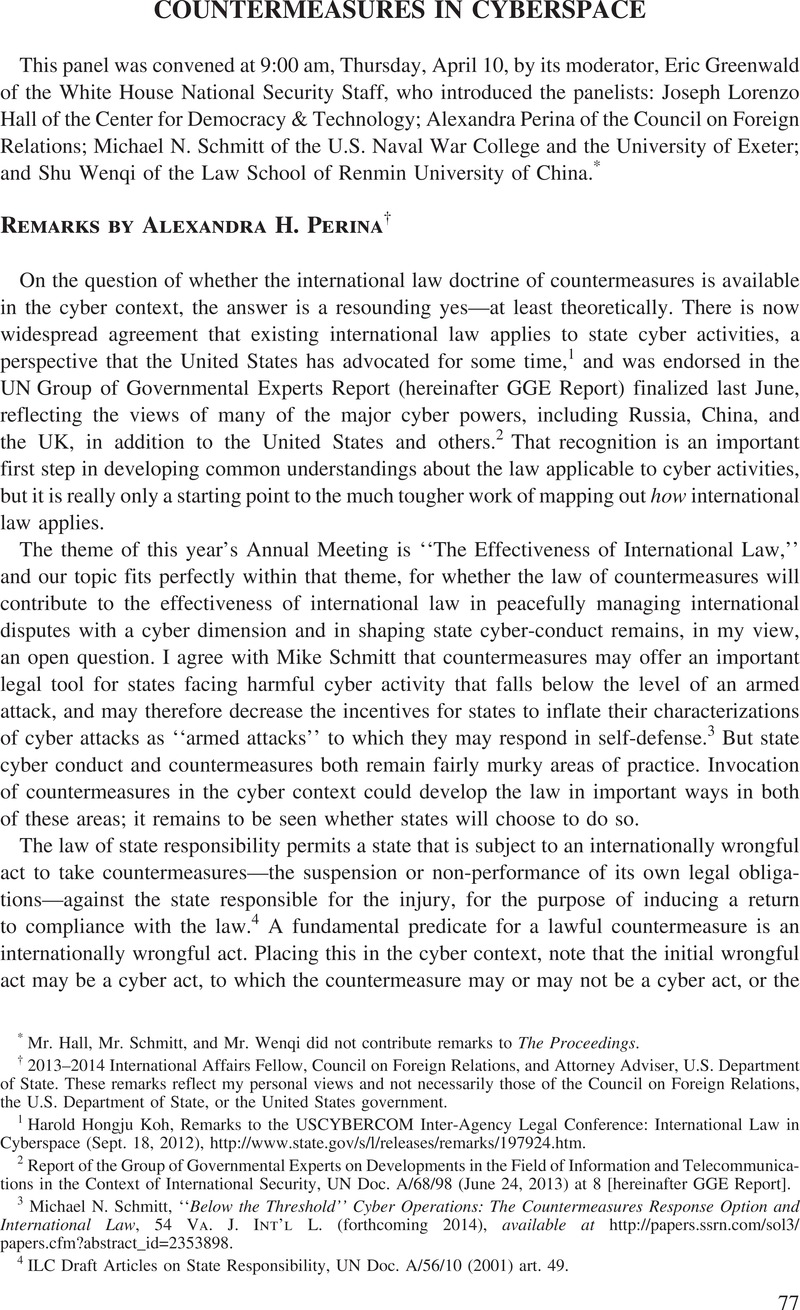No CrossRef data available.
Article contents
Remarks by Alexandra H. Perina
Published online by Cambridge University Press: 20 January 2017
Abstract

- Type
- Countermeasures in Cyberspace
- Information
- Copyright
- Copyright © American Society of International Law 2015
References
* Mr. Hall, Mr. Schmitt, and Mr. Wenqi did not contribute remarks to The Proceedings.
1 Harold Hongju Koh, Remarks to the USCYBERCOM Inter-Agency Legal Conference: International Law in Cyberspace (Sept. 18, 2012), http://www.state.gov/s/l/releases/remarks/197924.htm.
2 Report of the Group of Governmental Experts on Developments in the Field of Information and Telecommunications in the Context of International Security, UN Doc. A/68/98 (June 24, 2013) at 8 [hereinafter GGE Report].
3 Schmitt, Michael N., “Below the Threshold” Cyber Operations: The Countermeasures Response Option and International Law, 54 Va. J. Int’l L. (forthcoming 2014)Google Scholar, available at http://papers.ssrn.com/sol3/papers.cfm?abstract_id=2353898.
4 ILC Draft Articles on State Responsibility, UN Doc. A/56/10 (2001) art. 49.
5 GGE Report, supra note 2; Koh, supra note 1.
6 See Tallinn Manual on the International Law Applicable to Cyber Warfare 25 (Michael N. Schmitt ed., 2013) (Rule 1), https://ia601703.us.archive.org/22/items/TallinnManual/TallinnManual.pdf [hereinafter Tallinn Manual].
7 See id., Rule 10.
8 Corfu Channel Case (U.K. v. Albania), 1949 ICJ 4, 22 (Apr. 9); Armed Activities in the Territory of the Congo (DRC v. Uganda), 2005 ICJ 168, 226 (Dec. 19). See also UN General Assembly’s 1970 Declaration on Principles of International Law Concerning Friendly Relations Among States, UNGA Doc. A/RES/25/2625 (1970).
9 GGE Report, supra note 2 (emphasis added). It is notable that the GGE’s articulation of this principle is framed in terms of “should” rather than “must,” leaving open to speculation whether there was a lack of consensus about whether this norm reflects a binding legal obligation.
10 See Armed Activities in the Territory of the Congo, supra note 8.
11 See Schmitt, supra note 3, at 6; Tallinn Manual, supra note 6.
12 ILC Draft Articles, supra note 4, art. 25. Invoking necessity, of course, presumes that the injured state’s response was wrongful under international law, but it avoids a legal characterization of the injurious act.
13 See Glennon, Michael J., The Road Ahead: Gaps, Leaks and Drips, 89 Int’l L. Stud. 362, 384–85 (2013)Google Scholar.


